Health, Inequality and Behavior: GLO – supported Workshop on November 11-13 at Macquarie University, Sydney/Australia. More details see: KFZ-1, KFZ-2 and GLO.
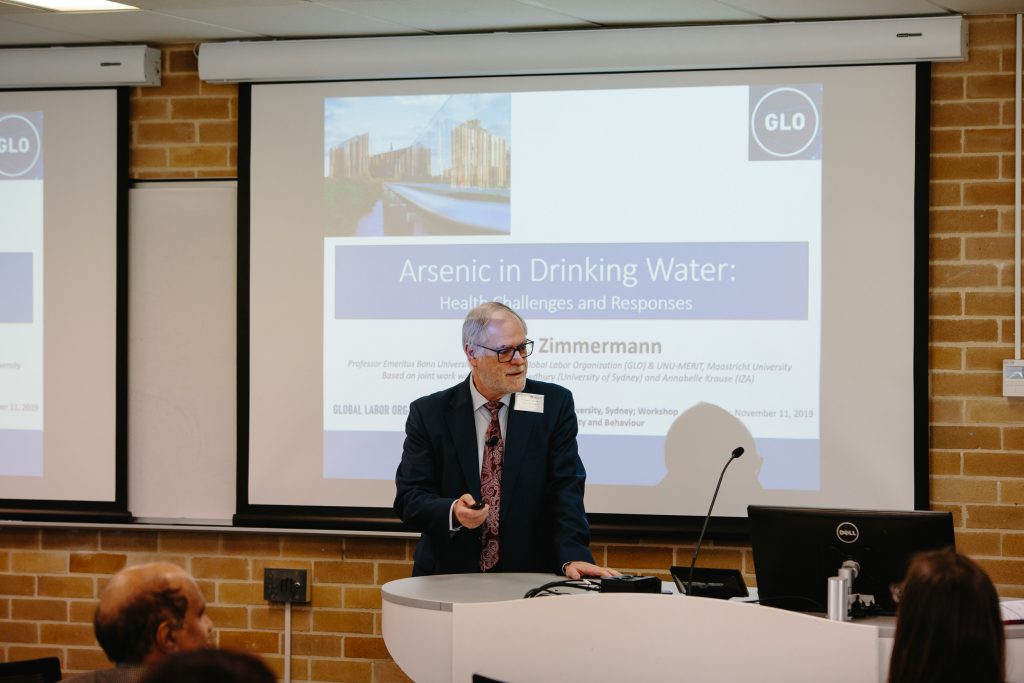
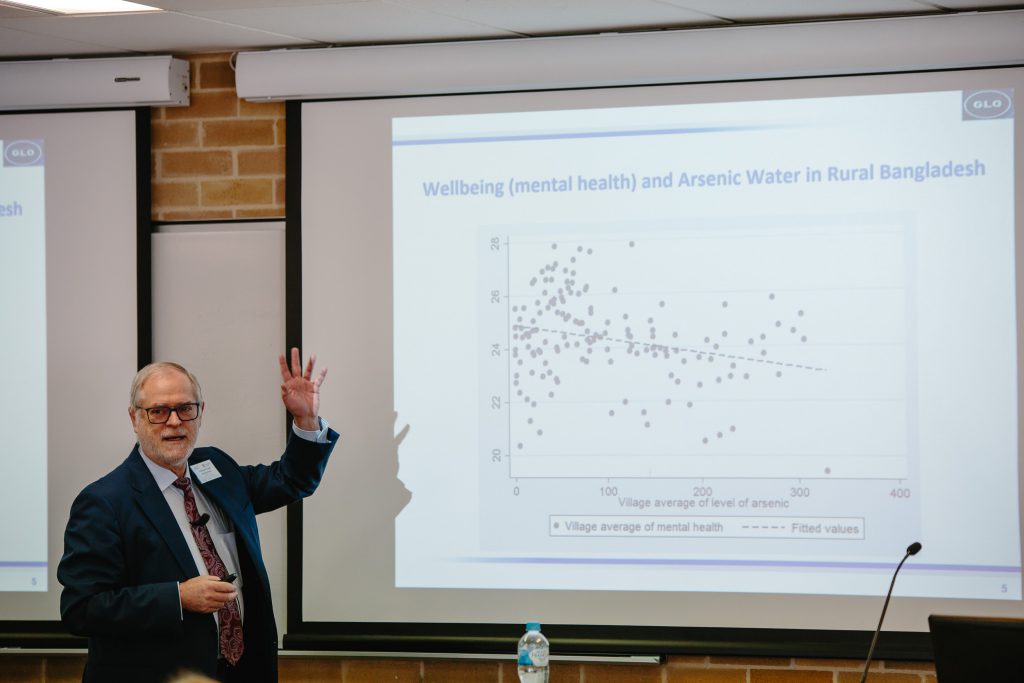
Ends;
Health, Inequality and Behavior: GLO – supported Workshop on November 11-13 at Macquarie University, Sydney/Australia. More details see: KFZ-1, KFZ-2 and GLO.








Ends;
In traditional couple formation males seem to attach more value to attractiveness and women seem to focus on earnings potentials. A new GLO Discussion Paper finds in an online dating field experiment that job status or job prestige does not play a role for initial contact interest for both sexes.
The Global Labor Organization (GLO) is an independent, non-partisan and non-governmental organization that functions as an international network and virtual platform to stimulate global research, debate and collaboration.
GLO Discussion Paper No. 422, 2019
Job Prestige and Mobile Dating Success: A Field Experiment – Download PDF
by Neyt, Brecht & Baert, Stijn & Vynckier, Jana
GLO Fellow Stijn Baert
Author Abstract: Research exploiting data on classic (offline) couple formation has confirmed predictions from evolutionary psychology in a sense that males attach more value to attractiveness and women attach more value to earnings potential. We examine whether these human partner preferences survive in a context of fewer search and social frictions. We do this by means of a field experiment on the mobile dating app Tinder, which takes a central place in contemporary couple formation. Thirty-two fictitious Tinder profiles that randomly differ in job status and job prestige are evaluated by 4,800 other, real users. We find that both males and females do not use job status or job prestige as a determinant of whom to show initial interest in on Tinder. However, we do see evidence that, after this initial phase, males less frequently begin a conversation with females when those females are unemployed but also then do not care about the particular job prestige of employed females.
GLO Discussion Papers are research and policy papers of the GLO Network which are widely circulated to encourage discussion. Provided in cooperation with EconStor, a service of the ZBW – Leibniz Information Centre for Economics, GLO Discussion Papers are among others listed in RePEc (see IDEAS, EconPapers). Complete list of all GLO DPs – downloadable for free.

Ends;
GLO President Klaus F. Zimmermann has been a Visiting Professor at Macquarie University in 2017. Now he was speaking at a GLO – supported Workshop on “Health, Inequality and Behavior” organized at the University under the leadership of Kompal Sinha, a Senior Lecturer and HDR Director at the Department of Economics of Macquarie University. Sinha is also an Associate Editor of the Journal of Population Economics, GLO Fellow and the GLO Research Cluster Lead for Development, Health Inequality and Behavior. Zimmermann was visiting the University from November 5-14 and was also involved in joint research with GLO Fellow Shyamal Chowdhury (University of Sydney) and Kompal Sinha.

Keynote speakers at the conference where Lisa Cameron (University of Melbourne), Andrew Jones (University of York), and Klaus F. Zimmermann (UNU-MERIT, Maastricht University & GLO). The conference started on November 11 with an address by Hon Chris Bowen MP, Shadow Minister for Health, followed by the keynote speech of GLO – President Klaus F. Zimmermann on “Arsenic in Drinking Water: Health Challenges and Responses”. See also. It ended with a farewell speech by the Head of the Economics Department, Elisabetta Magnani. Everybody was pleased with the wonderful meeting place and service, the excellent working conditions and the very high quality of the papers presented and the lively discussions.
Full Final Program.
More details: CONFERENCE WEBSITE.
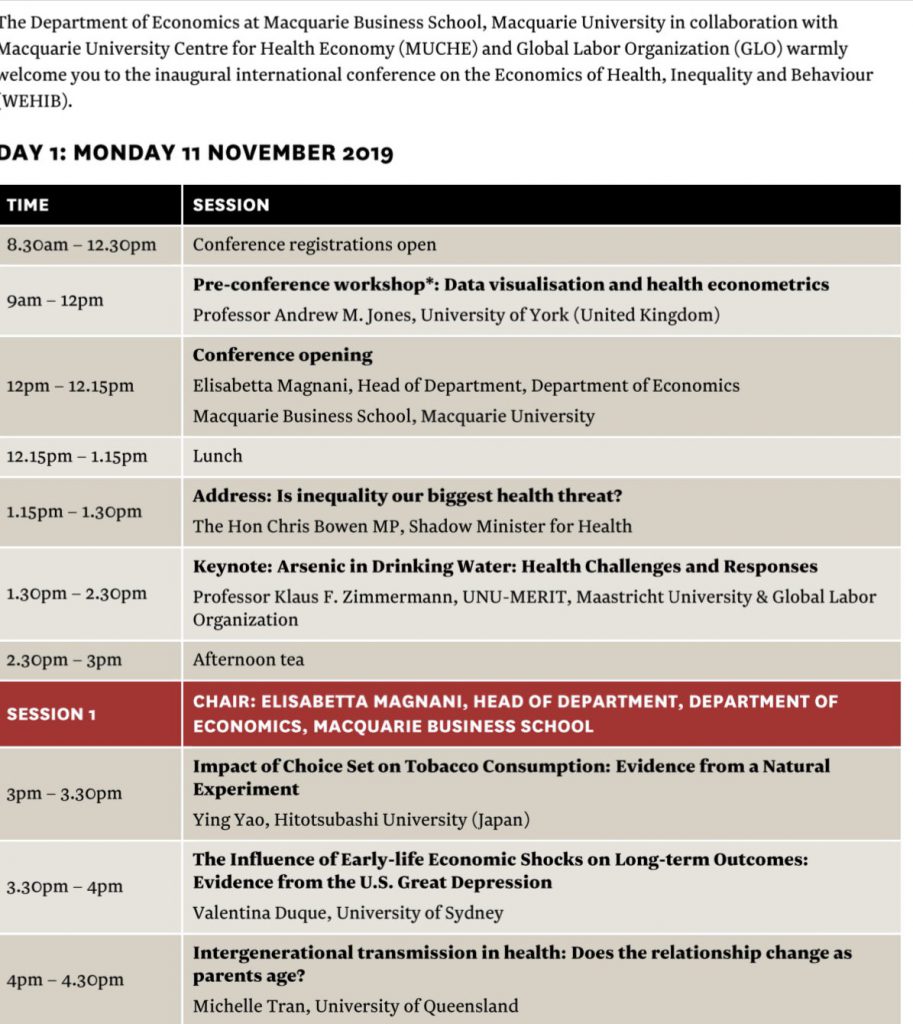
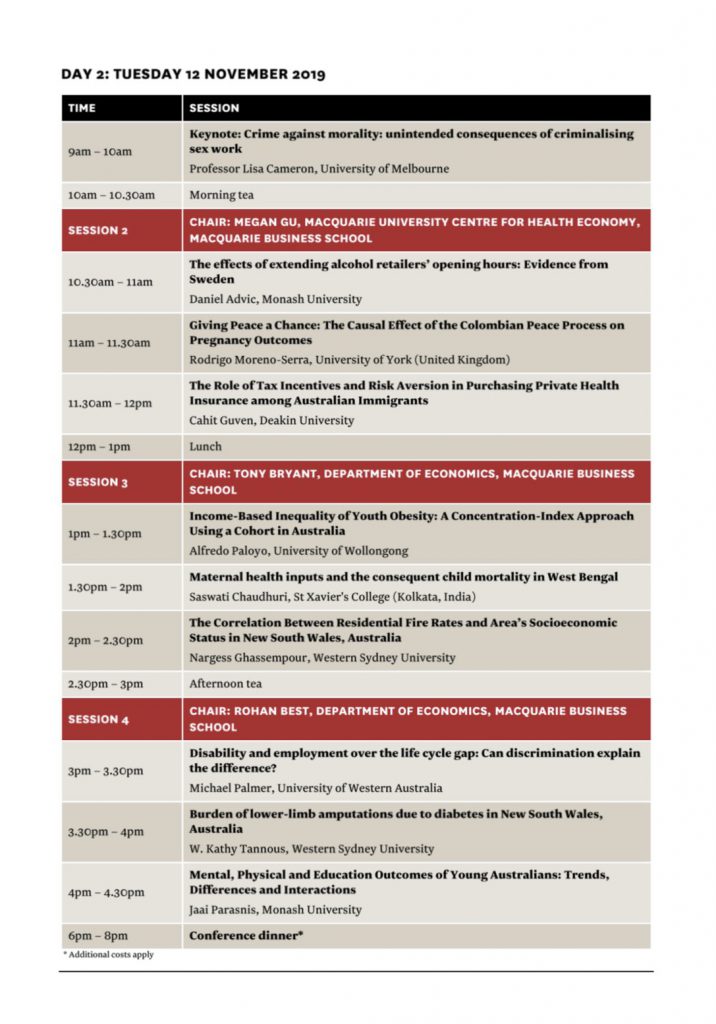
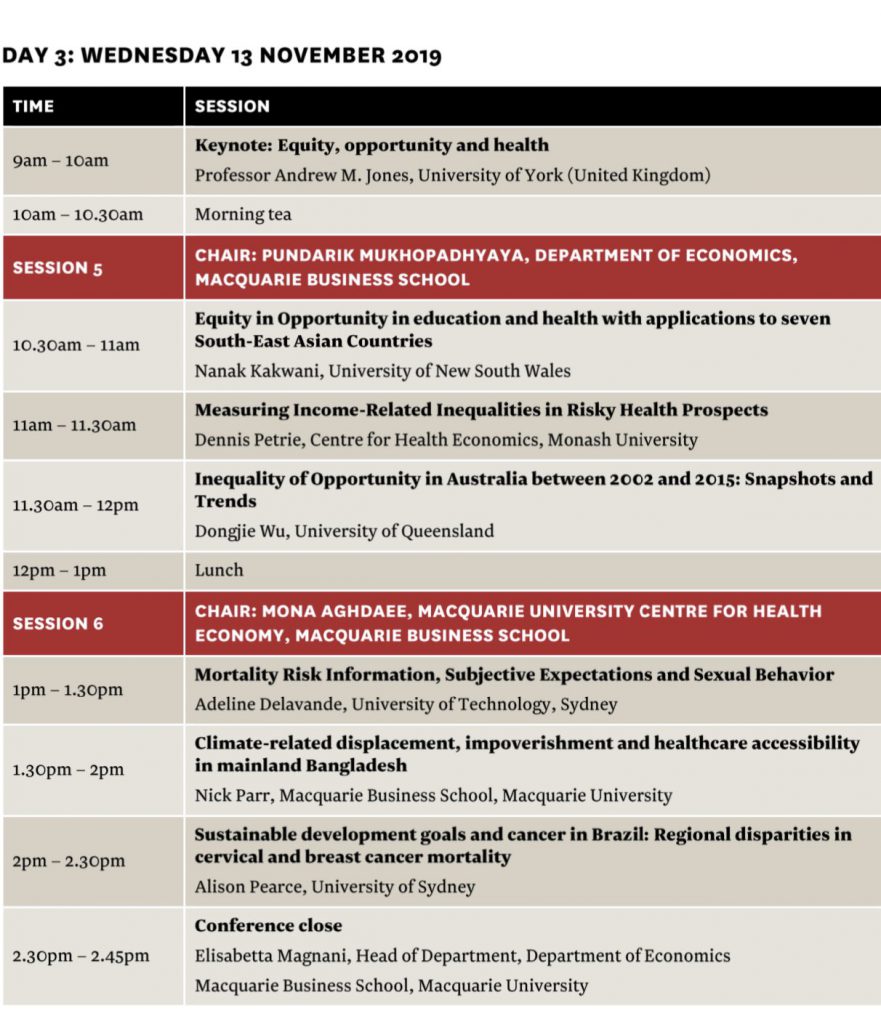
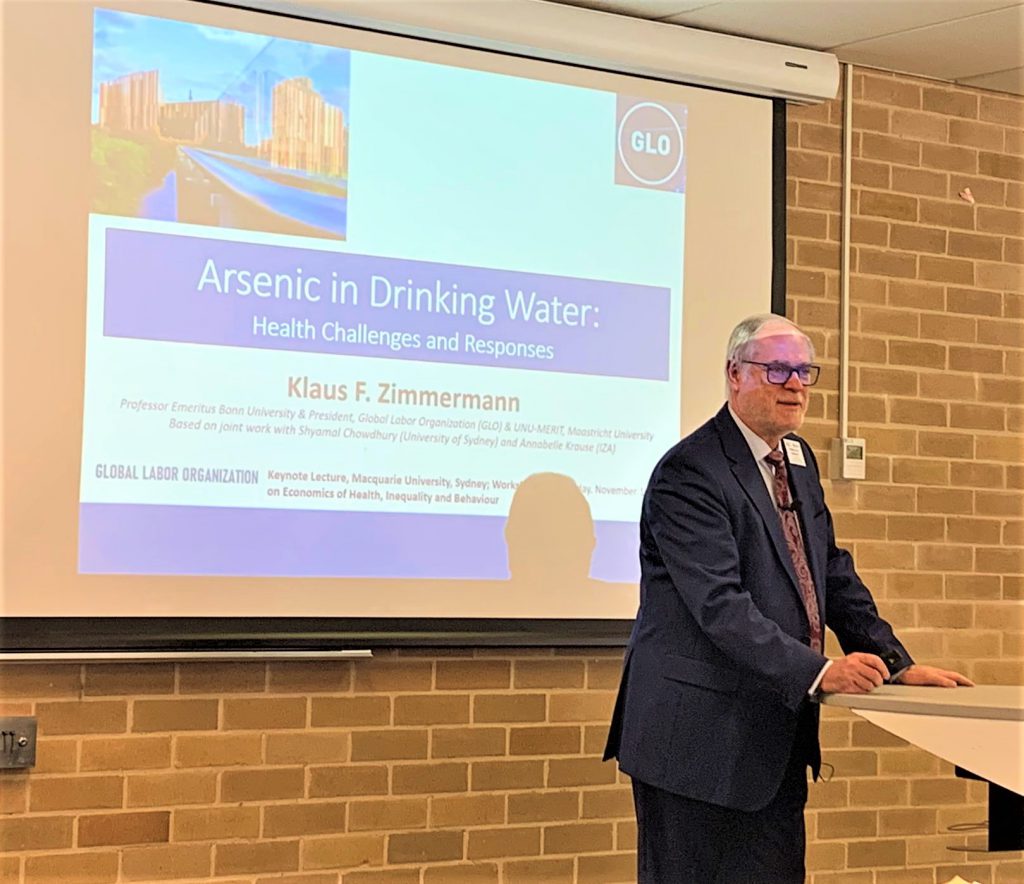
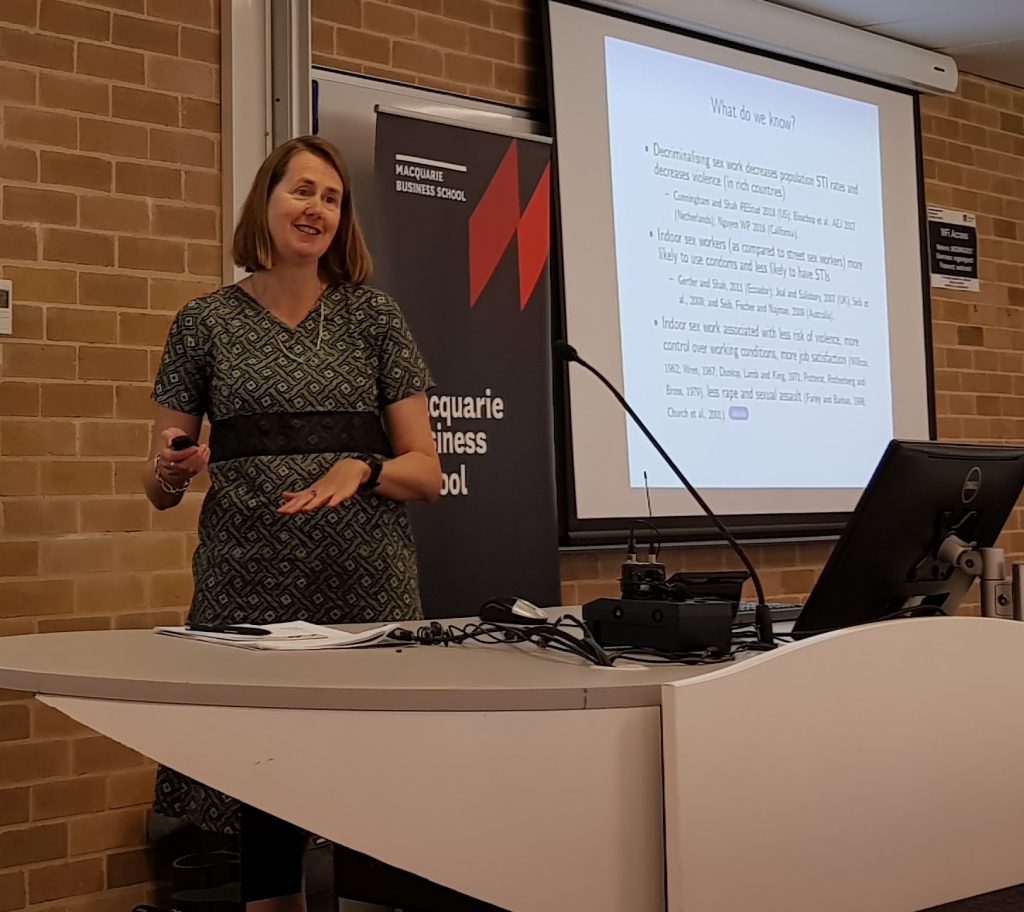
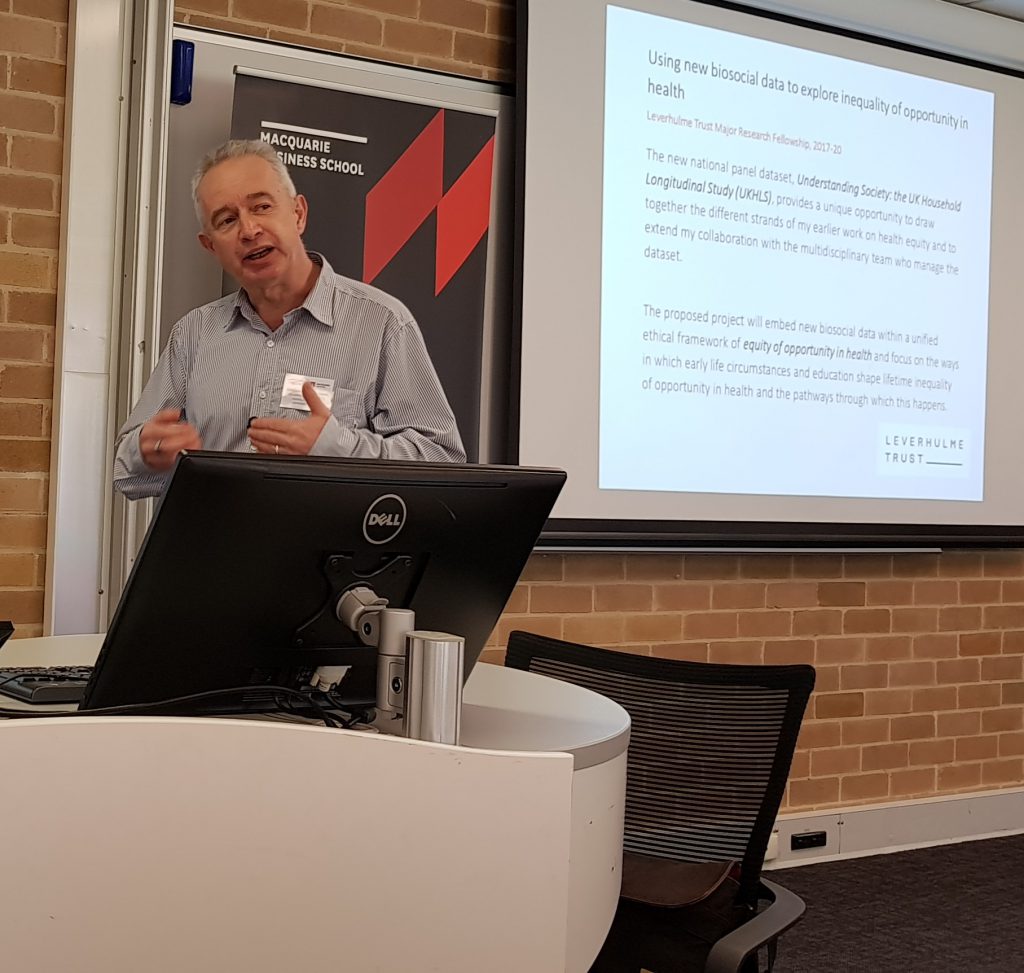
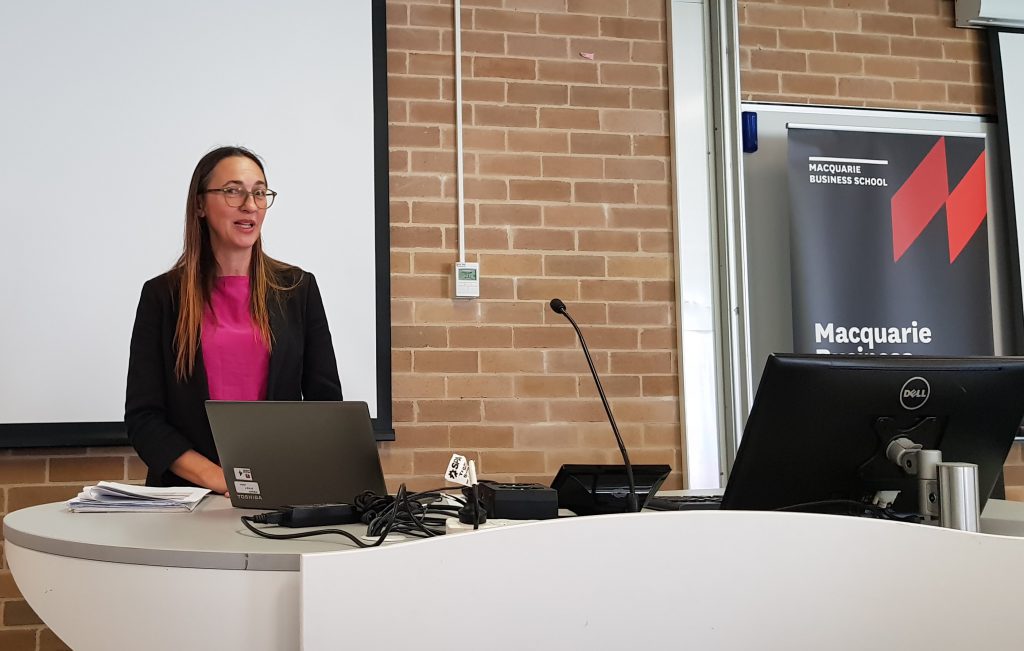

From the left Lisa Cameron, Kompal Sinha, Klaus F. Zimmermann, Andrew M. Jones, Hon Chris Bowen, Elisabetta Magnani and Rodrigo Moreno-Serra.
Ends;
Former communist party members often become successful entrepreneurs. A new GLO Discussion Paper is the first study to separate the causal effect of former Communist party membership from self-selection.
The Global Labor Organization (GLO) is an independent, non-partisan and non-governmental organization that functions as an international network and virtual platform to stimulate global research, debate and collaboration.
GLO Discussion Paper No. 423, 2019
Former Communist party membership and present-day entrepreneurship in Central and Eastern Europe – Download PDF
by Ivlevs, Artjoms & Nikolova, Milena & Popova, Olga
GLO Fellows Milena Nikolova & Olga Popova. Nikolova is also the GLO Cluster Lead “Economics of Happiness”.
Author Abstract: After the collapse of Communism in Central and Eastern Europe, former party members were particularly likely to start businesses and become entrepreneurs. However, it remains unclear whether this entrepreneurial activity was driven by the resources, information and opportunities provided by former party membership or because people with specific individual attributes were more likely to become party members (self-selection). This study is the first to separate the causal effect of former Communist party membership from self-selection. Using individual-level Life in Transition–III survey and instrumental variables analysis, we find that, in Central and Eastern European countries, membership of former Communist party has facilitated business set-up but not business longevity. Our results also suggest evidence of negative self-selection, meaning that people who joined the former ruling party tended have fewer of the traits associated with entrepreneurship such as motivation, risk tolerance, and entrepreneurial spirit. We show that former Communist party membership still matters for business practices, business ethics, and the nature of doing business in transition economies.
GLO Discussion Papers are research and policy papers of the GLO Network which are widely circulated to encourage discussion. Provided in cooperation with EconStor, a service of the ZBW – Leibniz Information Centre for Economics, GLO Discussion Papers are among others listed in RePEc (see IDEAS, EconPapers). Complete list of all GLO DPs – downloadable for free.

Ends;
Arrived from China, GLO President Klaus F. Zimmermann is visiting Macquarie University in Sydney from November 5-14. In 2017, he had been a Visiting Professor at Macquarie University before. Zimmermann enjoyed again the lovely city and its facilities, including the Macquarie Lake next to his hotel.



During this period, the Department of Economics at Macquarie University in collaboration with Macquarie University Centre for Health Economy (MUCHE) and the Global Labor Organization (GLO) are organizing an international workshop entitled the Economics of Health, Inequality and Behavior (WEHIB). This multidisciplinary event aims to foster dialogue among social scientists on the nexus between health, behavior, and inequality across developed and developing societies.
The event is chaired by Kompal Sinha, a Senior Lecturer and HDR Director at the Department of Economics of Macquarie University. Sinha is also an Associate Editor of the Journal of Population Economics and the GLO Research Cluster Lead for Development, Health Inequality and Behavior.
Keynote speakers are Lisa Cameron (University of Melbourne), Andrew Jones (University of York), and Klaus F. Zimmermann (UNU-MERIT, Maastricht University & GLO).
The conference started on November 11 with an address by Hon Chris Bowen MP, Shadow Minister for Health, followed by the keynote speech of GLO – President Klaus F. Zimmermann on “Arsenic in Drinking Water: Health Challenges and Responses”.
Full Final Program.
More details: CONFERENCE WEBSITE.
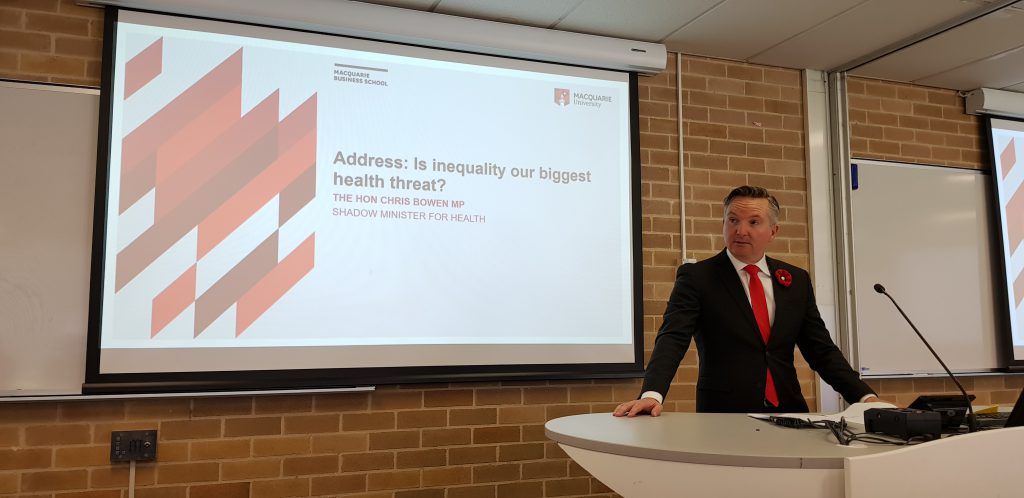




Ends;
The GLO Discussion Paper of the Month of October investigates the economic effects of sector-wide bargaining agreements in Portugal, finding that extensions may contribute to unemployment and firm closure.
GLO Discussion Papers are research and policy papers of the GLO Network which are widely circulated to encourage discussion. Provided in cooperation with EconStor, a service of the ZBW – Leibniz Information Centre for Economics, GLO Discussion Papers are among others listed in RePEc (see IDEAS, EconPapers). Complete list of all GLO DPs downloadable for free.
GLO Discussion Paper No. 413, 2019
30,000 minimum wages: The economic effects of collective bargaining extensions – Download PDF
by Martins, Pedro S.
GLO Fellow Pedro Martins
Author Abstract: Many governments extend the coverage of collective agreements to workers and employers that were not involved in their bargaining. These extensions may address coordination issues but may also distort competition by imposing sector-specific minimum wages and other work conditions that are not suitable for some firms and workers. In this paper, we analyse the impact of such extensions along several economic margins. Drawing on worker- and firm-level monthly data for Portugal, a country where extensions have been widespread, and the scattered timing of the extensions, we find that, while continuing workers experience wage increases following an extension, formal employment and wage bills in the relevant sectors fall, on average, by 2%. These results increase by about 25% across small firms and are driven by reduced hirings. In contrast, the employment and wage bills of independent contractors, who are not subject to labour law or collective bargaining, increases by over 1% following an extension.
420 Quantity and quality of work in the platform economy – Download PDF
by Bogliacino, Francesco & Codagnone, Cristiano & Cirillo, Valeria & Guarascio, Dario
419 Social Contacts, Dutch Language Proficiency and Immigrant Economic Performance in the Netherlands – Download PDF
by Chiswick, Barry R. & Wang, Zhiling
418 Anatomy of the Italian occupational structure: concentrated power and distributed knowledge – Download PDF
by Cetrulo, A. & Guarascio, D. & Virgillito, M. E.
417 Workplace Positive Actions, Trans People’s Self-Esteem and Human Resources’ Evaluations – Download PDF
by Bozani, Vasiliki & Drydakis, Nick & Sidiropoulou, Katerina & Harvey, Benjamin & Paraskevopoulou, Anna
416 Smartphone Use and Academic Performance: a Literature Review – Download PDF
by Amez, Simon & Baert, Stijn
415 Gender Gaps in Education – Download PDF
by Bertocchi, Graziella & Bozzano, Monica
414 Trans People, Transitioning, Mental Health, Life and Job Satisfaction – Download PDF
by Drydakis, Nick
413 30,000 minimum wages: The economic effects of collective bargaining extensions – Download PDF
by Martins, Pedro S.
412 Does Increased Teacher Accountability Decrease Leniency in Grading? – Download PDF
by Puhani, Patrick A. & Yang, Philip
411 Return, Circular, and Onward Migration Decisions in a Knowledge Society – Download PDF
by Constant, Amelie F.
410 Gender Identity Minorities and workplace legislation in Europe – Download PDF
by Sidiropoulou, Katerina
409 Intergenerational Income Mobility and Income Taxation – Download PDF
by Kurnaz, Musab & Soytas, Mehmet A
GLO DP Team
Senior
Editors: Matloob Piracha (University of Kent) & GLO; Klaus F.
Zimmermann (UNU-MERIT, Maastricht University and Bonn University).
Managing Editor: Magdalena Ulceluse, University of Groningen. DP@glabor.org

A new GLO Discussion Paper discusses the US gun-related murder rate and places it in an international perspective, where the US rate is 27 times the average rate for 22 other developed countries; and the gun ownership rate is over five times higher so that the murder rate per gun is 5 times higher.
The Global Labor Organization (GLO) is an independent, non-partisan and non-governmental organization that functions as an international network and virtual platform to stimulate global research, debate and collaboration.
GLO Discussion Paper No. 421, 2019
Greater US Gun Ownership, Lethality and Murder Rates: Analysis and Policy Proposals – Download PDF
by Schiff, Maurice
GLO Fellow Maurice Schiff
Author Abstract: This paper examines the US gun-related murder (GM) rate and places it in an international perspective. The data show that the US GM rate is 27 times the average rate for 22 other developed countries (ODC). Its gun ownership rate is 5.4 times that of ODC and the murder rate per gun is 5 times that of ODC. Thus, as is done in the paper, an effective reduction of the US GM rate requires an analysis of both the high gun ownership rate and the high murder rate per gun. The paper examines about fifteen gun-policy reforms – including their impact, cost, structure for maximum benefit – and other reforms affecting the GM rate. It also looks at the GM impact of immigration and of programs that provide alternative life pursuits for young men at risk. It further presents a number of policy implications and some new proposals designed to reduce the GM rate. Four appendices provide 1) results from two recent opinion polls on gun-policy reforms, 2) a detailed analysis of the relationship between gun ownership and the GM rate, 3) calculations of gun buyback costs, and 4) a correction of existing results on the Brady Bill’s impact on gun ownership.
GLO Discussion Papers are research and policy papers of the GLO Network which are widely circulated to encourage discussion. Provided in cooperation with EconStor, a service of the ZBW – Leibniz Information Centre for Economics, GLO Discussion Papers are among others listed in RePEc (see IDEAS, EconPapers). Complete list of all GLO DPs – downloadable for free.

Ends;
A new GLO Discussion Paper reveals that in the Netherlands good social contacts and a good mastery of the native language enhance immigrants’ economic performance.
The Global Labor Organization (GLO) is an independent, non-partisan and non-governmental organization that functions as an international network and virtual platform to stimulate global research, debate and collaboration.
GLO Discussion Paper No. 419, 2019
Social Contacts, Dutch Language Proficiency and Immigrant Economic Performance in the Netherlands – Download PDF
by Chiswick, Barry R. & Wang, Zhiling
GLO Fellows Barry Chiswick & Zhiling Wang
Author Abstract: Using longitudinal data on immigrants in the Netherlands from the survey ‘Social Position and Use of Public Facilities by Immigrants’ (SPVA) for the years 1991, 1994, 1998, 2002, we examined the impacts of social contacts and Dutch language proficiency on adult foreign-born men’s earnings, employment and occupational status. On average, social contacts and a good mastery of the Dutch language enhance immigrants’ economic performances. The effects are much stronger for immigrants with low-skill-transferability than for immigrants with high-skill-transferability, are stronger for economic migrants than for non-economic migrants, and are stronger for white-collar workers than for blue-collar workers. Contact with Dutch people and Dutch organisations unambiguously enhances all aspects of immigrants’ economic performance, however, no evidence is found for a positive effect of co-ethnic contact on employment status. To deal with the endogeneity between Dutch language ability and earnings, an interaction term between age at migration and a dichotomous variable for a non-Dutch-speaking origin is used as the identifying instrument. The selectivity issue of survey respondents was tackled as well to validate the main findings. The study has a strong policy implication for integration policies in the Netherlands, or more broadly in the immigrant receiving countries.
GLO Discussion Papers are research and policy papers of the GLO Network which are widely circulated to encourage discussion. Provided in cooperation with EconStor, a service of the ZBW – Leibniz Information Centre for Economics, GLO Discussion Papers are among others listed in RePEc (see IDEAS, EconPapers). Complete list of all GLO DPs – downloadable for free.

Ends;
A new GLO Discussion Paper reviews this timely issue for the digital labor markets where labor-intensive services are traded by matching requestors (employers and/or consumers) and providers (workers).
The Global Labor Organization (GLO) is an independent, non-partisan and non-governmental organization that functions as an international network and virtual platform to stimulate global research, debate and collaboration.
GLO Discussion Paper No. 420, 2019
Quantity and quality of work in the platform economy – Download PDF
by Bogliacino, Francesco & Codagnone, Cristiano & Cirillo, Valeria & Guarascio, Dario
GLO Fellows Francesco Bogliacino & Dario Guarascio
Author Abstract: This critical and scoping review essay analyses digital labour markets where labour-intensive services are traded by matching requesters (employers and/or consumers) and providers (workers). It first discusses to what extent labour platform can be treated as two-sided or multi-sided markets, and the implications of these classifications. It then moves to address the legal and regulatory issues implied by these technologies. From a theoretical point of view, using a framework where innovation is not neutral in the labour market, platforms have implications for the quantity of jobs, for the kind of skills and tasks which are exchanged, and in terms of bargaining power of the contracting parties. It includes a critical evaluation of the empirical evidence from a variety of sources.
GLO Discussion Papers are research and policy papers of the GLO Network which are widely circulated to encourage discussion. Provided in cooperation with EconStor, a service of the ZBW – Leibniz Information Centre for Economics, GLO Discussion Papers are among others listed in RePEc (see IDEAS, EconPapers). Complete list of all GLO DPs – downloadable for free.

Ends;
A new GLO Discussion Paper surveys evidence in the literature that trans people’s self-esteem and self-respect can be enhanced by policy makers’ positive actions to promote inclusivity at the workplace.
The Global Labor Organization (GLO) is an independent, non-partisan and non-governmental organization that functions as an international network and virtual platform to stimulate global research, debate and collaboration.
GLO Discussion Paper No. 417, 2019
Workplace Positive Actions, Trans People’s Self-Esteem and Human Resources’ Evaluations – Download PDF
by Bozani, Vasiliki & Drydakis, Nick & Sidiropoulou, Katerina & Harvey, Benjamin & Paraskevopoulou, Anna
GLO Fellows Nick Drydakis, Katerina Sidiropoulou & Anna Paraskevopoulou
Author Abstract: This study provides empirical patterns regarding trans people’s self-esteem-oriented reflections during observations of positive workplace actions. The case of a 2015 UK workplace guide is utilized to fulfill our aims. We adopt Rawls’ political philosophy framework in order to evaluate whether trans people’s self-esteem-oriented concepts might be enhanced by policy makers’ positive actions. The study does find that trans people’s self-esteem and self-respect are enhanced by policy makers’ positive actions to promote inclusivity in the workplace. Due to these actions trans people feel more accepted, valued and trusted by the government. We suggest that if a workplace policy is perceived to be recognizing trans people’s worth this may be internalized, resulting in positive self-evaluations by trans people. In addition, we present empirical patterns from HR departments which have been aware of the workplace guide. HR officers suggest that the workplace guide informs their strategies, and positively affects the creation of a more inclusive workplace culture, the corporate profiles of their firms and staff organizational behaviours (such as, achieving results, fostering collegiality, reducing complaints) and addresses LGBT business and trans staff-members’ needs. We suggest that if employers adopt policy makers’ positive workplace policies aiming to increase inclusivity, they may be able to realize positive organizational outcomes in their firms.
GLO Discussion Papers are research and policy papers of the GLO Network which are widely circulated to encourage discussion. Provided in cooperation with EconStor, a service of the ZBW – Leibniz Information Centre for Economics, GLO Discussion Papers are among others listed in RePEc (see IDEAS, EconPapers). Complete list of all GLO DPs – downloadable for free.

Ends;